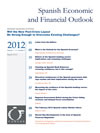Will the New Post-Crisis Layout Be Strong Enough to Overcome Existing Challenges?
Fecha: 2012
Spanish and International Economic & Financial Outlook, SEFO, V. 1 N.º 0
Sumario
[expand title= "What is the Outlook for the Spanish Economy? "]- Economic growth in Spain in 2011 as a whole was 0.7%. Although this was a better result than the -0.1% registered in 2010, the evolution throughout the year as a whole was negative and the growth outlook for 2012 points to further deterioration. The huge imbalances that built up during the expansionary phase are in the process of correction, but this will take some time and remain an obstacle to the start of recovery, leaving the economy extremely vulnerable to shocks. Nevertheless, towards the end of this year, some positive effects of fiscal consolidation, financial restructuring, and structural reform efforts, such as the labour market reform, may begin to show, ultimately leading to modest positive quarterly growth rates in 2013, albeit subject to a high degree of uncertainty.
- Leer más
- Over the past few years, the Spanish banking sector, an in particular the savings banks sector, has undergone a period of profound, historical change. Underpinned by a series of regulatory measures, Spanish financial sector reform set out to: foster sector reorganization to promote increased efficiency, change the legal framework governing the savings banks regimes, strengthen the sector’s capital ratios in line with new global requirements, and increase confidence through increased provisioning requirements related to real estate assets. At the same time, new incentives for further consolidation were introduced last February. Measurable results thus far demonstrate substantial progress. However, outstanding doubts remain regarding the adequacy of current levels of provisions, and whether the latest round of reforms will catalyse the necessary further downward adjustment to Spanish housing market prices. Reform efforts must continue. At the same time, it will be important to maintain some of the particular characteristics of the Spanish savings banking model, which has demonstrated benefits at the national level over the past 40 years. high degree of uncertainty.
- Leer más
- Significant progress has been made on regulatory reform of the Spanish banking sector in particular with regards to consolidation, and improved corporate governance, and most recently, strengthening provisioning requirements on real estate related assets. Overall, the new provisioning requirements for impaired assets related to real estate exposure should be sufficient to account for the anticipated further decline of real estate prices. However, in our view, questions remain regarding the ability of banks’ balance sheets to withstand potential additional reclassifications of currently normally performing real estate assets as impaired assets – a scenario which could realistically materialize over the coming years. Moreover, we must also consider whether or not more coverage is needed on other types of bank portfolio assets, such as corporate and mortgage loans, whose quality could also be subject to deterioration in the face of the negative economic outlook.
- Leer más
- A properly functioning repo market for government debt securities is critical to the efficient and smooth functioning of the financial markets as a whole. Suitable trading, clearing, and settlement infrastructure is a crucial component of ensuring the repo market can perform its pivotal role. In the Spanish case, deficiencies related to the lack of interconnectivity, together with the perception of weak risk management at the domestic Central clearing counterparty for repo, fuelled existing tensions experienced by domestic financial institutions seeking to fund their growing government debt portfolios. Access of the larger Spanish Banks to the main European CCPs, and second, the ECB three year refinancing operations, have provided some breathing space. However, the current situation is far from optimal, so infrastructure deficiencies must be properly addressed.
- Leer más
- The crisis has had a severe impact on the international and Spanish financial sector. Although the Spanish financial sector has been initially more resilient to the crisis than its European counterparts, additional challenges are growing. One of the variables most adversely affected by the crisis has been bank profitability. Reduced profitability has mostly been a consequence of the large amount of provisions that had to be dedicated to cleaning up balance sheets as a result of impaired assets related to the real estate sector, but also because of an increase in financial costs, a consequence of more restrictive capital markets conditions. Looking forward, we should expect further pressure on profitability ratios due to the expected economic contraction in 2012, the continuing process of private deleveraging and the likely adherence of the ECB to loose monetary policies. A further cceleration of the financial restructuring process and integration is needed for Spanish banks to reap the full benefits of economies of scale. Also, banks must continue implementing cost containment strategies to improve efficiency and make further advances to reduce spare capacity.
- Leer más
- Regional government fiscal slippage primarily explains Spain’s deviation from its 2011 deficit target. Delays in the regional governments’ fiscal consolidation process, together with the negative impact of the crisis on their revenues, have resulted in most of the autonomous communities missing their deficit targets for 2011. However, fiscal performance differs across the regions, suggesting underlying economic conditions and policies also vary substantially.
- Leer más
- The February 2012 labour market reform seeks to address some of the main structural problems of the Spanish labour market that have fuelled the huge rise in Spain´s unemployment since the onset of the crisis. The reform introduces changes in dismissals legislation that should decrease dismissal costs overall, as well as reduce “duality” (i.e. the gap between firing costs of permanent and temporary workers that has resulted in a disproportionate increase in temporary contracts). The reform also allows firms greater internal flexibility, encouraging adjustment through variables other than firing in times of economic downturn. Although not yet definitively approved by the Parliament, as it currently stands, the reform facilitates adjustment in wages and working conditions, making adjustment through layoffs less attractive.
- Leer más

